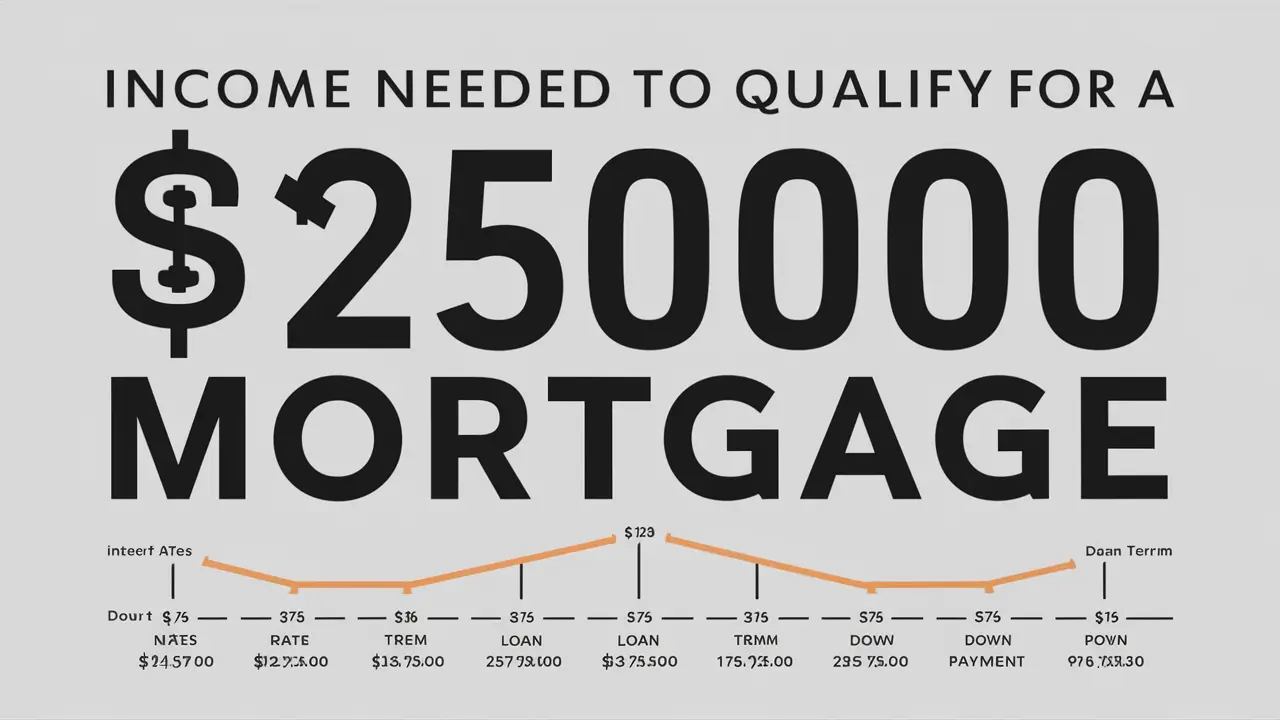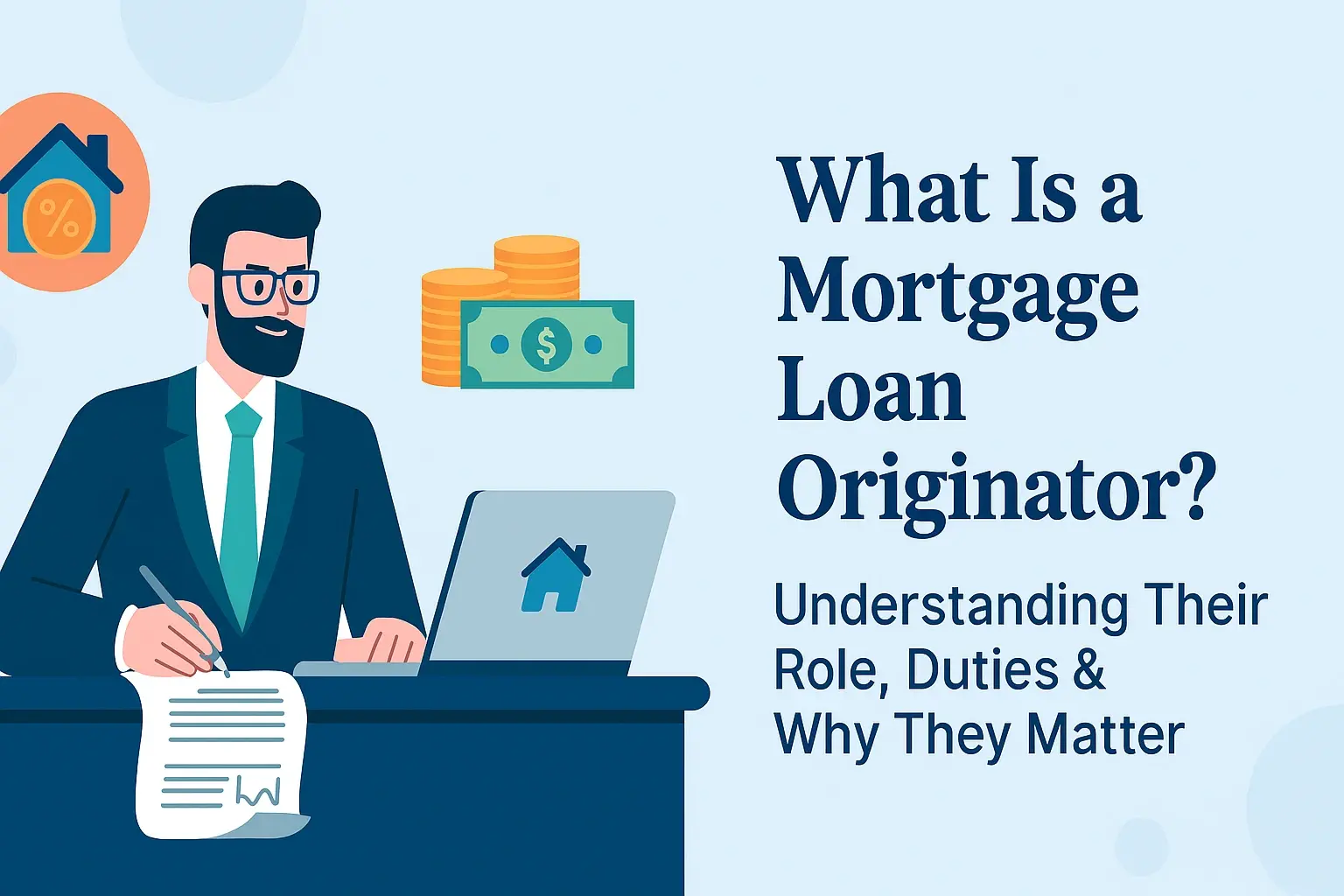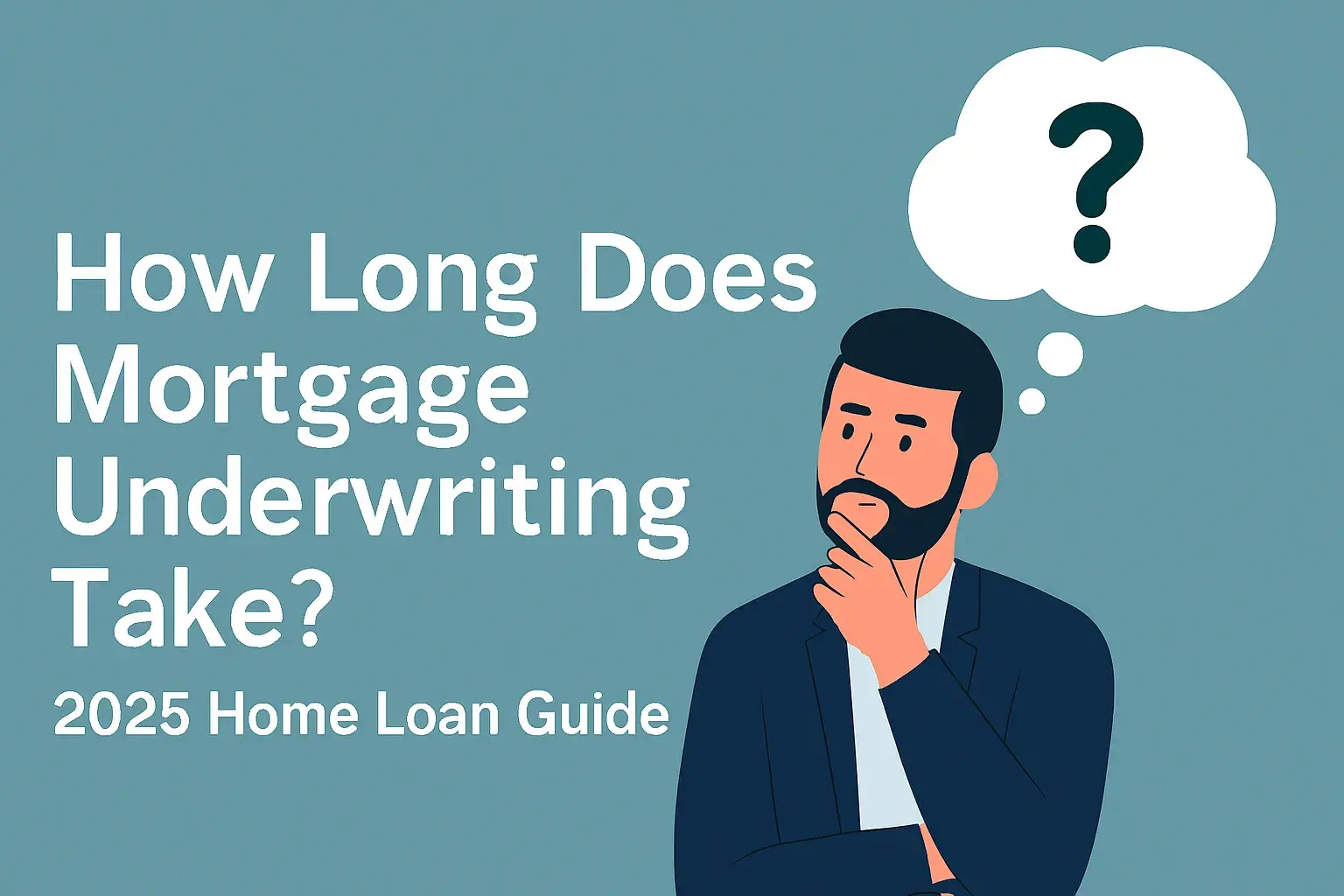-
Posted on: 26 Jul 2024

-
Buying a home is a significant financial undertaking, and securing a mortgage is a crucial step in the process. A common question for potential homeowners is: "How much income do I need to qualify for a $250,000 mortgage?" While there's no one-size-fits-all answer, understanding the factors that lenders consider will help you determine your eligibility and plan accordingly. This comprehensive guide explores the key elements that affect mortgage approval, including debt-to-income ratio, credit score, down payment, and other financial considerations.
Understanding the Core Factors: Income, DTI, and Credit Score
Lenders assess several factors to determine your ability to repay a mortgage. The most important of these are your income, debt-to-income ratio (DTI), and credit score. Let's break down each of these:
Income: The Foundation of Mortgage Approval
Your income is the primary source of funds for repaying the mortgage. Lenders want to see stable, reliable income that is sufficient to cover your mortgage payments, property taxes, homeowners insurance, and other debts. What constitutes "sufficient" depends on the other factors discussed below.
Types of Income Considered:
- Salary and Wages: This is the most common form of income and is typically verified through pay stubs and W-2 forms.
- Self-Employment Income: Lenders will scrutinize self-employment income more closely, often requiring two or more years of tax returns to assess its stability. They'll look at your net profit after expenses.
- Bonus and Commission Income: If you receive bonuses or commissions, lenders usually average them over a two-year period to determine a reliable monthly amount.
- Investment Income: Income from dividends, interest, or rental properties can be considered, but lenders will want to see a consistent track record.
- Social Security and Retirement Income: These sources of income can also be used to qualify for a mortgage, especially for retirees.
- Alimony and Child Support: If you receive alimony or child support, it can be considered income if it's court-ordered and expected to continue for at least three years.
Debt-to-Income Ratio (DTI): Balancing Your Finances
Your debt-to-income ratio (DTI) is a crucial metric that lenders use to evaluate your ability to manage debt. It's calculated by dividing your total monthly debt payments (including the proposed mortgage payment) by your gross monthly income. A lower DTI indicates that you have more disposable income available, making you a less risky borrower.
Calculating Your DTI:
- Calculate Your Gross Monthly Income: This is your income before taxes and other deductions.
- Calculate Your Total Monthly Debt Payments: Include all recurring debt obligations, such as:
- Credit card payments (minimum payment)
- Student loan payments
- Car loan payments
- Personal loan payments
- Child support/alimony payments
- The estimated mortgage payment (including principal, interest, property taxes, and homeowners insurance - often referred to as PITI)
- Divide Total Monthly Debt Payments by Gross Monthly Income: This gives you your DTI as a decimal. Multiply by 100 to express it as a percentage.
Example:
- Gross Monthly Income: $6,000
- Total Monthly Debt Payments (including estimated mortgage): $2,400
- DTI: ($2,400 / $6,000) * 100 = 40%
Acceptable DTI Ratios:
Generally, lenders prefer a DTI of 43% or less. Some programs, like FHA loans, may allow for higher DTI ratios, but these often come with stricter requirements. Conventional loans typically require a DTI below 43%, and sometimes even lower, closer to 36%. Lenders will often look at both the "front-end" and "back-end" DTI. Front-end DTI refers to housing expenses (PITI) divided by gross monthly income, and back-end DTI refers to all debt payments divided by gross monthly income. Aiming for lower ratios in both categories will improve your chances of approval.
Credit Score: A Reflection of Your Financial History
Your credit score is a numerical representation of your creditworthiness. It reflects your history of paying bills on time, managing debt, and overall financial responsibility. A higher credit score indicates a lower risk to lenders, making you more likely to qualify for a mortgage with favorable terms (i.e., lower interest rates).
Credit Score Ranges and Their Implications:
- Excellent (750+): You'll likely qualify for the best interest rates and loan terms.
- Good (700-749): You'll still have a good chance of approval, but your interest rate may be slightly higher.
- Fair (650-699): You may still be able to qualify, but you'll likely face higher interest rates and may need a larger down payment.
- Poor (Below 650): It will be challenging to get approved for a mortgage with a poor credit score. You may need to consider FHA loans or work on improving your credit before applying.
Minimum Credit Score Requirements for a $250,000 Mortgage:
The minimum credit score needed will depend on the type of loan you're applying for. Here's a general overview:
- Conventional Loan: Typically requires a credit score of 620 or higher.
- FHA Loan: May allow for credit scores as low as 500 with a larger down payment (10% or more), or 580 with a 3.5% down payment.
- VA Loan: While the Department of Veterans Affairs doesn't set a minimum credit score, lenders typically require a score of 620 or higher.
- USDA Loan: Lenders often look for a credit score of 640 or higher.
Calculating the Income Needed: A Practical Approach
Now, let's put these factors together to estimate the income you'll need to qualify for a $250,000 mortgage. We'll use a few scenarios to illustrate how different factors can affect the required income.
Assumptions:
- Mortgage Amount: $250,000
- Interest Rate: 6.5% (This is just an example; actual rates vary)
- Loan Term: 30 years
- Property Taxes: 1% of the home's value per year ($2,500 annually or $208.33 monthly)
- Homeowners Insurance: $1,200 annually or $100 monthly
- Private Mortgage Insurance (PMI): If down payment is less than 20%, PMI is required (estimated at 0.5% of loan amount annually or $104.17 monthly) - we will include this in scenarios requiring PMI.
- Other Monthly Debt Payments: This will vary in each scenario.
Estimating the Monthly Mortgage Payment (PITI):
First, we need to estimate the principal and interest (P&I) portion of the mortgage payment. Using a mortgage calculator, a $250,000 loan at 6.5% interest for 30 years results in a monthly P&I payment of approximately $1,580.00.
Now, we add property taxes, homeowners insurance, and PMI (if applicable) to get the total monthly housing expense (PITI):
- P&I: $1,580.00
- Property Taxes: $208.33
- Homeowners Insurance: $100.00
- PMI (if applicable): $104.17
- Total PITI (without PMI): $1,888.33
- Total PITI (with PMI): $1,992.50
Scenario 1: Low Debt, Good Credit, 20% Down Payment
- Credit Score: 720
- Down Payment: 20% ($50,000) - No PMI required
- Other Monthly Debt Payments: $300 (car loan, credit card minimums)
- Desired DTI: 36%
Total monthly debt payments (including mortgage): $1,888.33 + $300 = $2,188.33
Required Gross Monthly Income: $2,188.33 / 0.36 = $6,078.69
Required Annual Income: $6,078.69 * 12 = $72,944.28
Scenario 2: Moderate Debt, Fair Credit, 10% Down Payment
- Credit Score: 660
- Down Payment: 10% ($25,000) - PMI required
- Other Monthly Debt Payments: $500 (student loans, credit card minimums)
- Desired DTI: 43%
Total monthly debt payments (including mortgage): $1,992.50 + $500 = $2,492.50
Required Gross Monthly Income: $2,492.50 / 0.43 = $5,796.51
Required Annual Income: $5,796.51 * 12 = $69,558.12
Scenario 3: High Debt, FHA Loan, 3.5% Down Payment
- Credit Score: 580
- Down Payment: 3.5% ($8,750) - PMI required
- Other Monthly Debt Payments: $800 (student loans, credit card minimums, car loan)
- Desired DTI: 45% (FHA may allow slightly higher)
Total monthly debt payments (including mortgage): $1,992.50 + $800 = $2,792.50
Required Gross Monthly Income: $2,792.50 / 0.45 = $6,205.56
Required Annual Income: $6,205.56 * 12 = $74,466.72
Important Note: These are just estimations. Lenders will conduct a thorough assessment of your financial situation, and the actual income required may vary based on their specific underwriting guidelines.
Beyond Income: Other Factors Lenders Consider
While income, DTI, and credit score are paramount, lenders also consider other factors that can influence your mortgage approval and interest rate:
Employment History and Stability
Lenders prefer borrowers with a stable employment history. They typically look for at least two years of consistent employment in the same field. Frequent job changes can raise red flags, especially if they involve gaps in employment. If you're self-employed, lenders will want to see a consistent track record of income and business stability.
Down Payment Amount
The size of your down payment can significantly impact your mortgage approval and interest rate. A larger down payment reduces the lender's risk, as you have more equity in the property. It also reduces the loan amount, potentially lowering your monthly payments. A down payment of 20% or more allows you to avoid paying private mortgage insurance (PMI) on conventional loans.
Assets and Reserves
Lenders want to see that you have sufficient assets to cover closing costs, down payment, and a few months' worth of mortgage payments. This demonstrates your financial stability and ability to handle unexpected expenses. Assets can include savings accounts, investment accounts, and retirement funds.
Property Appraisal
The property must appraise for at least the purchase price. The lender will order an appraisal to ensure the property is worth the amount you're borrowing. If the appraisal comes in lower than the purchase price, you may need to renegotiate the price with the seller or increase your down payment.
Loan Type
Different loan types have different requirements. Conventional loans generally have stricter credit score and DTI requirements than FHA loans. VA loans offer favorable terms to veterans, and USDA loans are available to borrowers in rural areas. Research different loan options to find the one that best suits your financial situation.
Tips for Improving Your Mortgage Approval Chances
If you're concerned about qualifying for a $250,000 mortgage, here are some tips to improve your chances of approval:
- Improve Your Credit Score: Pay bills on time, reduce your credit card balances, and check your credit report for errors.
- Lower Your Debt-to-Income Ratio: Pay down existing debt, such as credit card balances or student loans.
- Save for a Larger Down Payment: The more you save, the lower your loan amount will be, and the better your chances of approval.
- Stabilize Your Employment: If possible, avoid changing jobs before applying for a mortgage.
- Gather Financial Documentation: Collect all necessary documents, such as pay stubs, tax returns, bank statements, and investment account statements.
- Get Pre-Approved: Getting pre-approved for a mortgage can give you a better understanding of how much you can borrow and demonstrate to sellers that you're a serious buyer.









